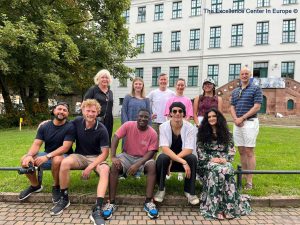Challenges of Syrian Refugees in Germany: Germany is the first destination in Europe that is reached for refugees fleeing Syria. Refugees search for skilled smugglers who will transport them across the seas to reach their dreams of safety, shelter, and dignity that are reflected in the laws of Europe.
As a result of the war in Syria that has been waged since 2011, the Syrian refugees in Germany make up the largest proportion of refugees. Hundreds of thousands of people have been killed and millions more have been displaced outside their homeland, prompting many to seek safety from the Syrian regime’s artillery and the terror and killings of ISIS.
Syrian refugees have come to EU countries with Germany taking the largest proportion of these refugees. Germany accepts about one million Syrian refugees from different war zones. Refugees in Germany face many challenges, including the following:
German language
Learning German is an important skill for living in Germany. Besides communicating on a daily basis, a refugee needs mastery of the language in order to find employment or to study at a German university. Syrian refugees who have been recognized with refugee status are entitled to receive free German language courses to help him or her learn the language within a year.
This right is not given, however, to those who receive the so-called German language “Duldung” or a temporary suspension of deportation. These persons must pay for a German language course if they want to learn the language.
Search for Accommodation
When they first arrive, Syrian refugees are housed in different shelters throughout Germany. Subsequent to that, the search to find suitable accommodations begins. The problem for Syrian families in locating housing, particularly when some families exceed seven or ten members, is a difficult and challenging undertaking.
German families have fewer family members as compared to Arab families, and this makes finding housing that is spacious enough to accommodate an Arab family problematic. In addition, the German Labor Office (Job Center) is restricted in the amounts of monthly rents and space they are allowed to distribute. Because of this office’s legal restrictions, many refugees end up living in remote areas of the city.
Racism
Syrian refugees, particularly those who live in relatively small villages or towns in Germany, as well as those living in the east of Germany, face racist acts and harassment by some people, including verbal harassment, defamation, and abuse, such as beatings or property damage.
In Germany, extremist right-wing groups are calling for the return of refugees to their homeland and refusal for the settlement of refugees in Germany, as well as calling for more restrictive measures governing refugees who do reside in Germany.
Family Reunion
Family reunification measures are complicated and slow to achieve in Germany. Many cases may take upwards of one to two years in order to bring children or parents from Syria to Germany. This period involves much paperwork, applications, and the time required for these transactions and the procedures for obtaining visas from various German embassies, especially ones located in Lebanon and Turkey.
As a result of lengthy delays, many children between ages 15 and 16 suffer from various psychological problems due to the absence of their parents.



